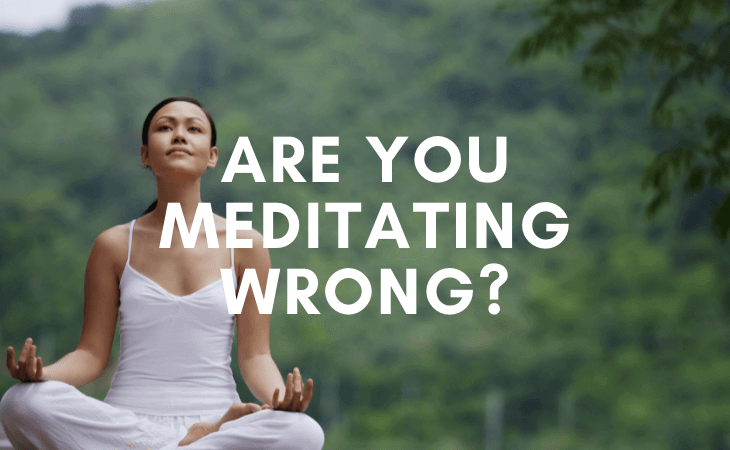Are you meditating wrong? It’s a question we ask ourselves time and time again.
When you start meditating it’s so easy to feel like you’re doing it wrong.
You sit down to meditate. Your legs are crossed. Your back is straight. You’re following your breath. And damn, a thought. And another one. And another one. Soon enough you’re drowning in your thoughts, and chalk up today’s meditation session as a loss.
There has to be something you’re missing? This can’t be the holy grail that everyone is talking about.
Feeling this way is all too common.
Below we dive into a few of the most common meditation mistakes that trip up most beginner meditators.
1. You’re Wrapped Up in the “Shoulds”
A lot of times our beliefs about what meditation is can end up ruining your meditation practices. For instance, you might think that meditation means you should instantly drop into a deep place of bliss, silence, and inner awareness.
Anything else must mean you’re doing it wrong.
Now, this simply isn’t the case.
One way to avoid this is to view meditation as a “practice”. Over time you will get better. But, the only thing you should worry about in the beginning is showing up.
If you haven’t meditated before, then your mind is going to be incredibly cloudy.
As you meditate you might think that things are getting worse, but if you’re showing up, and following your breathe for 20 minutes or so, and bringing your attention back to your breath when you lose it, then you are making progress.
Over time, the dust will settle. You will get better.
Note: If you want help starting your practice or learning the ins and outs of meditation check out our list of the best meditation apps.
2. You’re Attached to the End Result
Are you meditating only for the benefits alone? All you want is to be less stressed, or maybe your ultimate goal is enlightenment?
Whatever your main reasons for starting to meditate, it can be easy to get attached to the end result. Then, when you don’t experience those benefits, or feel like you’re moving backwards, then you lose yourself to frustration.
Meditation is all about the present moment. The results will come, and maybe when they do come you won’t care so much about them.
Dedicate yourself to your practice, and the results will come. But, if you take your goal-oriented approach into meditation you’re only going to feel like you’re not getting there fast enough.
3. You Get Angry at Noise and “Distractions”
Are you incredibly picky about the environment you meditate in? Yes, it’s important to establish a routine, but intrusions do occur. You sit down to meditate and when you’re finally in the zone, your roommate knocks on the door asking about rent. or, your cell phone rings.
How do you handle the situation? Do you snap at them, and tell them you’re meditating? Or, do you laugh at the intrusion, and resume your practice?
Meditation is the art of attention. If you’re practicing mindfulness meditation, then these distractions and noises can actually be a blessing. They aren’t interruptions, but simply things you can pay attention to and watch pass, just like your thoughts.
4. You Brain Isn’t Clear or Empty
Your mind will never be clear or empty. If you meditate on a regular basis you will develop a deeper understanding of your mind.
But, it’s very rare that you’ll simply drop into a deep nothingness. States like these do come, and they also leave, just like the rest.
Meditation will help you to build a new awareness to all of your internal states and be able to witness them, without letting them dictate your life.
5. Thinking Is Not the Problem
“I can’t meditate, because I can’t stop thinking, meditation just isn’t for me.” Thinking is never the problem. Your brain will continue to think and create problems forever. That’s what it does.
Meditation will change your relationship with your thoughts. Instead of being so closely identified with your thoughts, you’ll begin to realize they are just thoughts, they aren’t true or false. And they’ll generally go away once you stop getting so wrapped up in them.
Over time, you’ll start to become a witness to your thoughts, and you’ll be able to laugh at how ridiculous some of them actually are.
If you commit to meditation on a regular basis, and avoid the mistakes above you are meditating. Don’t worry so much. The effects of meditation are subtle. Stick with it and you will reap the rewards.
—
Image: Miriam Espacio
